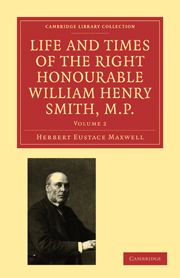Book contents
- Frontmatter
- Contents
- ILLUSTRATIONS TO THE SECOND VOLUME
- CHAPTER I 1878–1880
- CHAPTER II 1880–1881
- CHAPTER III 1882–1884
- CHAPTER IV 1880–1885
- CHAPTER V 1871–1891
- CHAPTER VI 1885
- CHAPTER VII 1886–1887
- CHAPTER VIII 1887
- CHAPTER IX 1888
- CHAPTER X 1889
- CHAPTER XI 1890
- CHAPTER XII 1891
- CHAPTER XIII 1891
- APPENDIX
- INDEX
- Plate section
CHAPTER VIII - 1887
Published online by Cambridge University Press: 29 August 2010
- Frontmatter
- Contents
- ILLUSTRATIONS TO THE SECOND VOLUME
- CHAPTER I 1878–1880
- CHAPTER II 1880–1881
- CHAPTER III 1882–1884
- CHAPTER IV 1880–1885
- CHAPTER V 1871–1891
- CHAPTER VI 1885
- CHAPTER VII 1886–1887
- CHAPTER VIII 1887
- CHAPTER IX 1888
- CHAPTER X 1889
- CHAPTER XI 1890
- CHAPTER XII 1891
- CHAPTER XIII 1891
- APPENDIX
- INDEX
- Plate section
Summary
It was under the discouragement of the events narrated in the last chapter that Smith had to enter upon his duties as leader of the House of Commons. Parliament assembled on January 27, and it immediately became evident that the Opposition had drawn encouragement from what had taken place since the autumn. Their spirits were further raised by the speech of Lord Randolph Churchill, who, taking an early opportunity to explain the causes of his resignation, dwelt not only on having been unable, as Chancellor of the Exchequer, to become responsible for the Estimates presented to him by the heads of the Admiralty and War Office, but added—
Of course, sir, it would be idle to deny what has, I fancy, become fairly well known—that there were other matters of grave importance on which it was my misfortune to hold opinions differing from those of Lord Salisbury.
Taken in conjunction with the anticipated reunion of the Liberal ranks as the outcome of the Round—Table Conference, this speech seemed to indicate that not only would the Government have to face an Opposition reinforced by the return of the Liberal-Unionists, but would also have on their flank a watchful and bitter critic in the person of the late Chancellor of the Exchequer.
When Lord Randolph Churchill had delivered his personal explanation and sat down, Smith rose to make his first speech as leader of the House, and prefaced his observations on Lord Randolph's statement by a few deprecatory words, almost homely in their simplicity:—
I have, sir, on rising, to make an appeal to the House. […]
- Type
- Chapter
- Information
- Life and Times of the Right Honourable William Henry Smith, M.P , pp. 187 - 215Publisher: Cambridge University PressPrint publication year: 2010First published in: 1893

